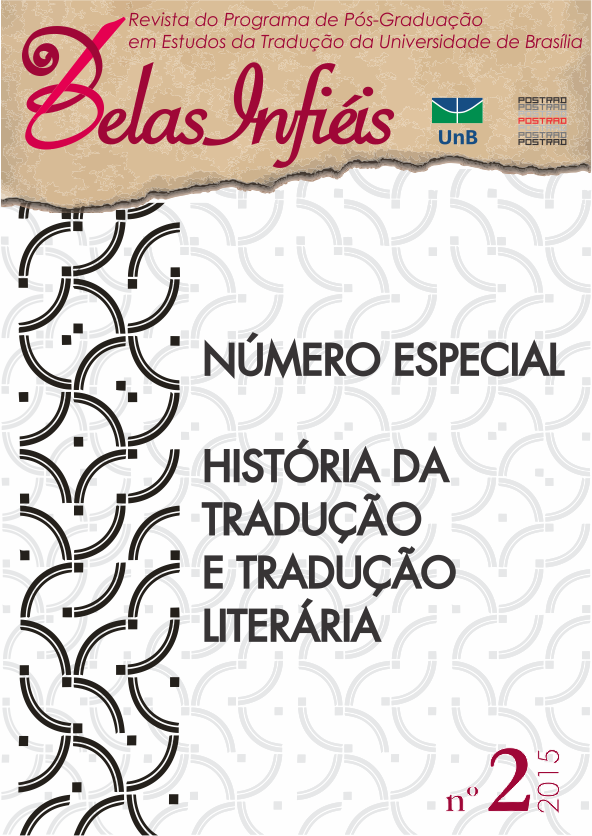POR UMA HISTÓRIA DAS TRADUÇÕES DE JAMES JOYCE NO BRASIL
DOI:
https://doi.org/10.26512/belasinfieis.v4.n2.2015.11341Palabras clave:
História da tradução, História das traduções, James Joyce, crítica de traduçãoResumen
Marcas geográficas, culturais e linguísticas costumam delimitar o trabalho do pesquisador que pretende escrever uma história da tradução. Mesmo válido e útil o balizamento, a abordagem histórica da tradução não abarca apenas o conjunto de técnicas, tendências e teorias tradutórias de determinados períodos e locais, isto é, o que se pensou sobre tradução, mas também as próprias traduções. Em outras palavras, também se deve considerar a importância da história das traduções de um determinado autor ou obra, uma história cuja construção ocorrerá sempre dentro de limites espaciais e temporais determinados pelo pesquisador. Este artigo pretende estabelecer as bases para a construção de uma história das traduções das obras de James Joyce no Brasil, apresentando exemplos claros de desafios certamente encontrados pelo pesquisador em seu percurso.
Descargas
Citas
AMARAL, Vitor Alevato do. Literalmente Joyce: uma retradução de Dubliners. Rio de Janeiro, 2013. Tese (Doutorado em Linguística Aplicada) ”“Universidade Federal do Rio de Janeiro, Rio de Janeiro, 2013.
BALLARD, Michel. Histoire de la traduction. Repère historiques et culturels.Coleção Traducto [com objetivos pedagógicos]. Bruxelas: De Boeck Supérieur, 2013.
CAMPOS, Augusto de. Entrevista com Augusto de Campos no joycentenário. Ilha do Desterro, Florianópolis, EDUFSC, n. 12, vol. 2, p. 25-35, 1984.
ELIA, Silvio (1978). Romantismo e linguística. In: GUINSBURG, J. (org.). O Romantismo. São Paulo: Perspectiva, 2002, p. 113-135.
HALLEWELL, Laurence (1985). O livro no Brasil. Sua história. 3ª ed. São Paulo: Edusp, 2012.
JOYCE, James. Dubliners. Estabelecimento textual de Robert Scholes; A. Walton Litz. Nova Iorque: Penguin Books, 1996. Col. The Viking Critical Library. Texto da clássica edição de 1967.
_______. Dublinenses. Trad. Hamilton Trevisan. Rio de Janeiro: Civilização Brasileira, 1964.
_______. Dublinenses. Trad. José Roberto O’Shea. São Paulo: Siciliano, 1993.
_______.Dublinenses. Trad. José Roberto O’Shea. São Paulo: Hedra, 2012a.
_______. Dublinenses. Trad. Guilherme da Silva Braga. Porto Alegre: L&PM, 2012b.
_______. Do Ulysses, de Joyce. Joaquim. Curitiba, Imprensa Oficial do Paraná, n. 4, 4 de setembro de 1946, 2000, p. 17. Fac-símile.
_______. Ulisses. Trad. Trad. Antonio Houaiss. Rio de Janeiro: Civilização Brasileira, 1966.
_______. Ulisses. Trad. Bernardina da Silveira Pinheiro. Rio de Janeiro: Objetiva, [2005] 2007.
_______. Ulysses. Trad. Caetano W. Galindo. São Paulo: Penguin / Companhia das Letras, 2012c.
MUTRAN, Munira. A recepção de Joyceno Brasil. In: NESTROVSKI, Arthur (org.). Riverrun. Ensaios sobre Joyce. Rio de Janeiro: Imago, 1992, p. 427-446.
SENN, Fritz. Joycean Murmoirs. Fritz Senn on Joyce. Christine O’Neill (org.). Dublim: The Lillipt Press, 2007.
VAN HOOF, Henri. Histoire de la traduction en occident. France, Grande-Bretagne, Allemagne, Russie, Pays-Bas. Paris: Duculot, 1991.
VENUTI, Lawrence. The Translator’s Invisibility. A history of Translation. Nova Iorque: Routledge, 2008.
WENINGER, Robert. The Institutionalization of ‘Joyce’: Joycein (West) Germany, Austria and Switzerland, 1945 to the present. In: LERNOUT, Geert; MIERLO, Wim Van (orgs.). The Reception of Joycein Europe. V. 1, Germany, Northern and East Central Europe. Londres: Thoemmes Continuum, 2004.
Descargas
Publicado
Cómo citar
Número
Sección
Licencia
Copyright Statement
Given the public access to this journal, the texts are free to use but requires the recognition of the original authorship and initial publication in this journal to be properly stated.
The journal allows the use of works published for non-commercial purposes, including the right to submit the work to publicly accessible databases. Published contributions are the sole and exclusive responsibility of the author(s).
- When submitting papers to be evaluated by the Belas Infiéis journal, the author(s):
- Declare that the contents of the contributions are original and of their original creation, being entirely responsible for their content if there is an objection by third parties.
- Claim to be aware that they should not commit academic plagiarism.
- Declare that the manuscript has not been published, completely or partially, in Portuguese or another language. If it is a translation it should be submitted to the Translated Articles section.
- Declare that the manuscript is not being evaluated by other journals.
- Declare that the manuscript was not submitted to another journal simultaneously.
- Commit(s) to inform the journal of any kind of error or inaccuracy in their contribution (published, in evaluation or in editing) and to collaborate with the editors to make due corrections of the article (when in evaluation or editing) or erratum/retraction (after publication).
- Declare that there is no conflict of interest regarding the published work.
- Authorize its release if it is accepted for publication without any kind of monetary compensation.
- Agree to assign non-exclusive rights to publication to the magazine, remaining free to make their contribution available in other media as long as the publication of the first version in Belas Infiéis magazine is mentioned. They also authorize Belas Infiéis to assign their texts for reproduction in content indexers, virtual libraries and similar platforms.
- Maintain copyright and grant the journal the right of first publication, the work being licensed under theCreative Commons Attribution License.
- Is/Are allowed and encouraged to publish and distribute their work online after the editorial process, which may increase the impact and citation of the published work.
- Authorize the editorial team to make textual adjustments and to adapt the article to the publication rules, when necessary.



















